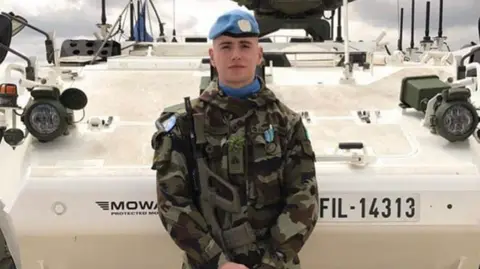A recent court decision in Lebanon has drawn significant attention following the sentencing of a man to death for the killing of Irish soldier, Private Seán Rooney. This tragic incident occurred during a United Nations peacekeeping mission, marking a poignant moment for both Ireland and its military forces. On December 14, 2022, Pte Rooney was tragically killed when the armoured vehicle he was traveling in came under gunfire while en route to Beirut. The 24-year-old’s death is particularly notable, as he was the first Irish soldier to lose his life in a UN peacekeeping operation in Lebanon in over two decades, indicating the dangers faced by military personnel in such missions.
The main defendant in this high-profile case, identified as Mohammad Ayyad, did not appear in the court proceedings held on a recent Monday, wherein the death sentence was handed down. Alongside Ayyad, several other individuals were convicted in relation to the assault that resulted in Pte Rooney’s death. This outcome was confirmed by Irish broadcaster RTÉ, which reflected the sentiments shared by many regarding the measures taken against those accountable for the peacekeeper’s death.
Following the announcement of the sentence, Taoiseach Micheál Martin expressed his mixed feelings. While he welcomed the conviction of Ayyad, he expressed dissatisfaction over the fact that the defendant is “still at large.” Martin further remarked that many believe the sentences imposed on the other defendants seemed excessively lenient. He highlighted the importance of honoring the role of peacekeepers, emphasizing that such service is “the most noble cause of all.” His concerns were echoed by Simon Harris, the Tánaiste (the deputy prime minister), who noted disappointment regarding the lighter sentences announced for the remaining defendants.
In his statements, Martin expressed profound sympathy for the family of the deceased, especially for Pte Rooney’s mother, Natasha. He acknowledged the exemplary courage of Seán Rooney, emphasizing his commitment by stating that he had “put the safety of others before his own.” Both leaders underlined the heavy emotional burden this moment poses for Pte Rooney’s family, encapsulating the palpable sense of loss felt due to this tragic incident.
Moreover, Tánaiste Simon Harris elaborated on the investigative progress regarding the case. He expressed frustration over the “slow pace of proceedings” within the Lebanese Military Tribunal. Harris, who visited Beirut in March, engaged with Lebanese officials about the delay in the case concerning the death of Pte Rooney. He emphasized that the justice system’s sluggishness was a source of anguish, demonstrating the heightened scrutiny and concern regarding how foreign troops, particularly those from Ireland, are treated in international military law contexts.
The incident and subsequent court ruling have not only captured public attention but also serve as a reminder of the sacrifices made by peacekeeping forces worldwide. Pte Rooney’s untimely death has pierced the hearts of many, and the continuing quest for justice underscores the complexities and perils that come with military service in volatile regions.
As Irish authorities closely monitor the situation, there is hope for enhanced protective measures, both legally and operationally, for peacekeepers engaged in missions that aim to stabilize conflict zones and safeguard innocent lives. With the Lebanese court having made its decision, the response from Ireland’s military and government leaders reflects a commitment to ensuring justice is pursued vigorously, demonstrating solidarity with those who serve their countries in the most dangerous environments.












